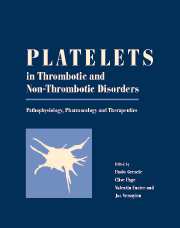Book contents
- Frontmatter
- Contents
- List of contributors
- Editors' preface
- PART I PHYSIOLOGY
- PART II METHODOLOGY
- PART III PATHOLOGY
- PART IV PHARMOLOGY
- PART V THERAPY
- 68 Design of trials to evaluate antiplatelet agents
- 69 Antiplatelet therapy in cardiology
- 70 Antiplatelet therapies in neurology
- 71 Antiplatelet treatment in peripheral vascular disease
- Afterword: Platelets: a personal story
- Index
- Plate section
70 - Antiplatelet therapies in neurology
from PART V - THERAPY
Published online by Cambridge University Press: 10 May 2010
- Frontmatter
- Contents
- List of contributors
- Editors' preface
- PART I PHYSIOLOGY
- PART II METHODOLOGY
- PART III PATHOLOGY
- PART IV PHARMOLOGY
- PART V THERAPY
- 68 Design of trials to evaluate antiplatelet agents
- 69 Antiplatelet therapy in cardiology
- 70 Antiplatelet therapies in neurology
- 71 Antiplatelet treatment in peripheral vascular disease
- Afterword: Platelets: a personal story
- Index
- Plate section
Summary
The major role of antiplatelet therapy in neurology is in the acute treatment and secondary prevention of ischemic stroke caused by arterial thromboembolism and, in some patients, atrial fibrillation. Because ischemic stroke is one of the most common neurological conditions, antiplatelet agents are used widely by neurologists and their patients.
Stroke
Definition
Stroke is characterized by rapidly developing clinical symptoms and signs of focal, and at times global, loss of cerebral function lasting more than 24 hours or leading to death, with no apparent cause other than that of vascular origin.
Incidence/prevalence
Stroke is a worldwide problem with an incidence of about 2 per 1000 per year. The prevalence is about 9–12 per 1000. Stroke can occur at any age, but half of all strokes occur in people over 70–75 years of age.
Etiology
About 80% of all strokes are ischemic in nature and are due to cerebral infarction, usually resulting from thrombotic or embolic occlusion of a cerebral artery; the remainder are caused by either intracerebral hemorrhage (15%) or subarachnoid hemorrhage (5%). The causes of ischemic stroke include embolism via, or from, the heart (20%), large artery atherothromboembolism (45–50%), small artery microatheroma/lipohyalinosis (25%), other arteriopathies such as dissection and arteritis (5%), and hematological disorders causing a prothrombotic state (<5%).
Prognosis
Stroke kills 4.5 million people each year throughout the world, making it the third most common cause of death in most developed countries. About 10% of individuals with acute ischemic stroke die within 30 days of stroke onset, and 30% by 1 year.
- Type
- Chapter
- Information
- Platelets in Thrombotic and Non-Thrombotic DisordersPathophysiology, Pharmacology and Therapeutics, pp. 1040 - 1054Publisher: Cambridge University PressPrint publication year: 2002



